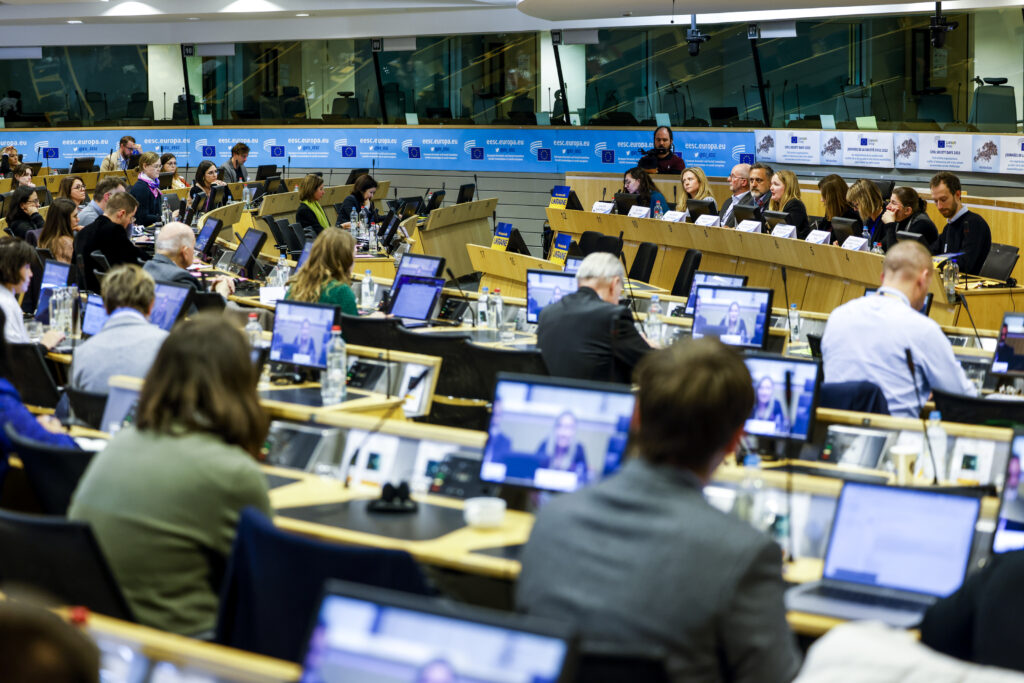Philea calls for enabling environment at the Civil Society Days 2023
What are the most pressing shrinking space issues and barriers for civil society, including philanthropy? What can be done to address the democratic deficit in the EU and reinforce civil dialogue? Is it time to rethink the way civil society is funded? These were some of the questions discussed by civil society representatives and policymakers during the joint Philea – Social Platform workshop at the 2023 edition of the European Economic and Social Committee Civil Society Days. The complete recording of the session is available here.
Setting the scene: barriers and shrinking space issues – The example of Romania
Barriers to the activities of foundations, associations and cross-border philanthropy are diverse and very tangible. Hanna Surmatz, Head of Policy at Philea, and Ionut Sibian, Member of the EESC Civil Society Organisations’ Group, both with more than 20 years’ experience in the field, know this well. Hanna Surmatz kicked off the panel with some real-life examples of barriers:
- Imagine your government introduces a restrictive law allowing only two weeks of consultation during the summer break – can this be considered a participatory process?
- If you want to move your seat as a CSO or foundation from one member state to another, or if you want to merge across border, there is high legal uncertainty and you often need to wind up and re-establish, whereas for-profit companies do this all the time.
- If you engage in advocacy work and political activities, your status as a tax exempt PBO might be put at risk.
- You are a charity who wants to open a bank account – the bank denies this because it considers operations in a different country as too risky. [1]
Ionut Sibian[2] then highlighted the situation in Romania, including both a law proposal to restrict public gatherings and a bill presented to amend the law on associations and foundations, with the motivation that “civil society organisations are against the public good”. These attempts have been proposed more than once since 2017, constituting “a worrying trend which ultimately harasses civil society”.
Overcoming these barriers in view of 2024 European elections: what can be done?
Views from Civil Society
Alva Finn, Secretary-General at Social Platform, the platform of European social NGOs, asked the panel to focus on solutions. The2024 EU elections will be a key moment to ask for concrete steps on better civil society space, recognition and dialogue. So what can be done to improve the operating space for civil society, including philanthropy, in view of the elections?
Bringing the perspective of civil society organisations, Alva observed that despite the existence of several important building blocks, such as the initiatives announced in the EU Social Economy Action Plan, the European Parliament call for a European Statute for Associations and NPOs, the Commission report on civic space within the Charter of Fundamental rights annual review and the review of the European Democracy Action plan, an overall strategy for civil society is still lacking. That’s why Social Platform and Civil Society Europe decided to launch a coalition campaign calling for a European strategy for civil society. “This would allow to address the current fragmentation of practices and initiatives and the many challenges civil society is still facing on the ground” said Riccardo Rossella, Coalition and campaign officer at Social Platform & Civil Society Europe, who is also the main point of contact for the new campaign. “We know that societies are better when everyone has a chance to participate, including those in vulnerable situations who often go unheard in EU decision-making. Yet civil dialogue, as defined in the EU treaties, is weak in comparison with social dialogue – dialogue between employers and workers at EU level. The current practices and standards on civil dialogues are still inconsistent among and within institutions. To harmonise them, we will be calling for an interinstitutional agreement on civil dialogue’’.

European Commission and European Fundamental Rights Agency perspective
Commission representatives Anna Athanasopoulou and Ingrid Bellander Todino presented the initiatives taken by their respective Directorates to support civil society.
Anna Athanasopoulou, Head of Unit in DG Internal Market, Industry, Entrepreneurship and SMEs announced that the Proposal for a legislative initiative on cross-border activities of associations is expected for the second quarter of 2023. The initiative complements the Council recommendations to develop framework conditions for social economy and the set of guidance for the tax treatment of associations and foundations and cross-border philanthropy, also announced in the Social Economy Action Plan. It follows up on the European Parliament resolution adopted in February 2022. “The Commission is currently assessing priorities for a legislative initiative on helping overcome cross-border activities of associations and NPOs, by looking at a targeted and proportionate approach’”, she stated.
Ingrid Bellander Todino, Head of Unit in DG Justice and Consumers,referred to the Commission’s 2022 Annual report on the application of the EU Charter of Fundamental Rights as an important tool for the development of an EU policy which supports civil society in its essential role of protecting fundamental rights. This will be put in place in different areas, namely: protection, support (including access to funding as seen in the CERV programme) and empowerment, which will be pursued by the Commission through initiatives like the Defence of Democracy package.
She also referred to the upcoming Council conclusions on civic space sparking some criticism from civil society representatives in the panel, who stated that more dialogue around the conclusions would have been expected.
Finally, Waltraud Heller, Programme manager for Cooperation with civil society at the EU Agency for Fundamental Rights explained the five key needs for civil society identified in the 2022 edition of the yearly FRA report on civic space[3]: recognition, resources, representation in the form of civil dialogue, regulation and resilience. She also stated that compared to five years ago many initiatives have been put in place to strengthen civil society space. Even more is in the pipeline and could be done.
The issue of funding, specifically core funding, came up several times in Waltraud Heller`s intervention, both in the context of the upcoming review of the Financial Regulation (resources) and as a need to achieve more resilience of civil society. It was also picked up in several questions from the floor, calling for the EU to ensure that EU funding programmes involve CSOs appropriately and to shift from project-cycle to more structural funding.
“We would not set any priorities without the input from CSOs”, Ingrid Bellander Todino said, also acknowledging a positive example in going through intermediaries to channel resources to grassroots level provided by the new CERV Programme.
Anna Athanasopoulou pointed to Member States as holding important funding[4] for civil society to complement EU funds, and cited the Commission’s InvestEU as an interesting pilot to experiment investment products coming from the philanthropic sector with an impact investing angle. InvestEU and the move of foundations towards mission-related investments were also mentioned by Hanna Surmatz.
Moving forward: conclusions from the workshop and recommendations to EU institutions
The space for civil society and democracy cannot be taken for granted. This call resonated throughout the 2023 edition of the EESC Civil Society Days, from the alarm raised by EESC President Christa Schweng in the opening session, to the conclusions of our own workshop, where Jan Dirx, Vice-President of the EESC Civil Society Organisations’ Group, drew on some worrying examples from the Netherlands, his home country. He cited the dominance of nationalist and populist presence in social media and the repercussions on civil dialogue and civil society space, as well as the attempts to limit access to justice for CSOs by certain political parties.
To protect and expand this space, in her conclusions Hanna Surmatz pointed out the need to put together all the building blocks which stemmed from the workshop, in an approach which should also include candidate countries. In the key recommendations from the workshop, which were presented at the Civil Society Days Closing session and will be directed to the EU institutions, she summarised them as a call for comprehensive European strategy for civil society, including philanthropy, to connect different building blocks for a truly empowering space. This entails renewing engagement and implementing structured civil dialogue across EU institutions; enabling legal, tax and policy frameworks for CSOs, including cross-border work and funding; and building resilience and trust, including access to flexible and sustainable resources, be they private or public.
The EESC picked up on the aforementioned Civil Society Days` key recommendations in its extraordinary meeting of the CSO Group, entitled “Civil society organisations defending and strengthening European democracy” which took place on Thursday 30 March 2023. DG Justice and Consumers` Marie-Hélène Boulanger also underlined the importance of civil society organisations’ participation in the ongoing public consultations regarding the Defence of Democracy to ensure that the package does not impose unintended consequences on the civil society space when introducing policy measures to strengthen European institutions against covert foreign influence. This was echoed by Waltraud Heller, who underlined the importance of ex-ante impact assessments on the rule of law and fundamental rights, and in particular on civil society space to prevent over implementation of the expected new policy that will deal with foreign funding. These points were previously raised by Hanna Surmatz when she, together with other civil society representatives, met with Commissioner Jourova on the matter.
[1] See Comparative Highlights of Foundation Law.
[2] Ionut Sibian is also the Executive Director of the Civil Society Development Foundation in Bucharest. He contributed to a 2019 EESC opinion on Philanthropy
[3] The FRA yearly report on civil Space is based on extensive consultation with civil society and research at MS level.
[4] For example under the Recovery and Resilience Facility
Contact

